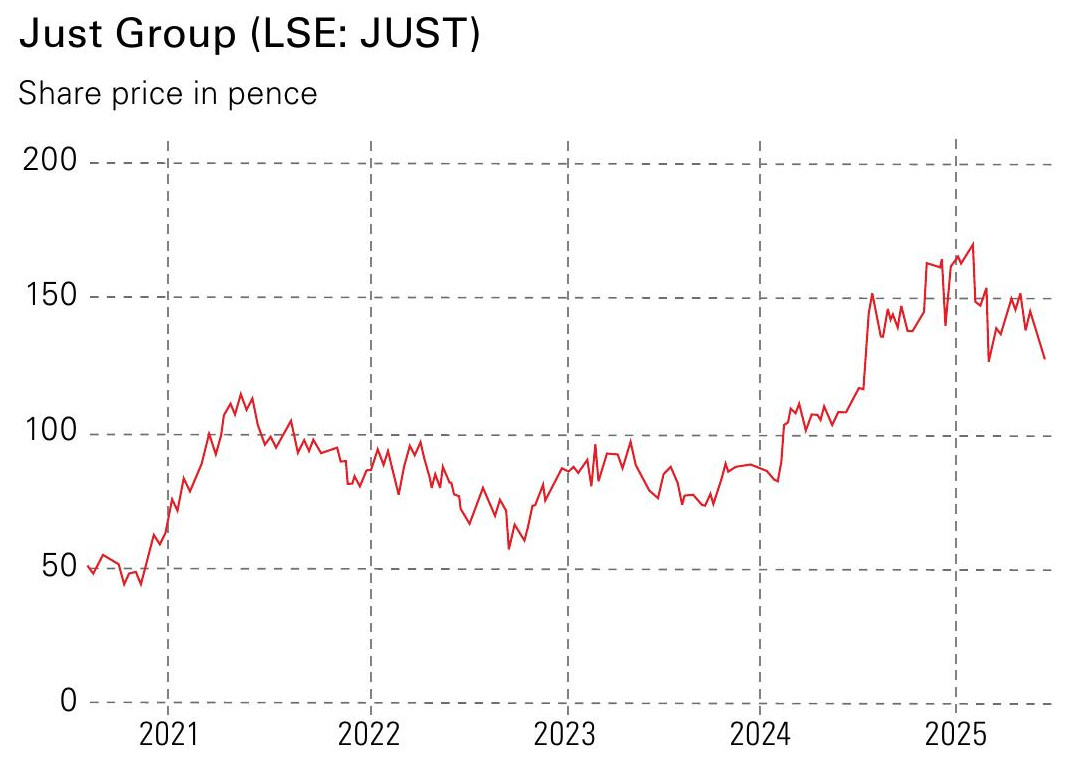Just Group has the wind behind it – should you invest?
Just Group, a retirement products provider, is well placed to profit from a growing annuity market


Get the latest financial news, insights and expert analysis from our award-winning MoneyWeek team, to help you understand what really matters when it comes to your finances.
You are now subscribed
Your newsletter sign-up was successful
Want to add more newsletters?

Twice daily
MoneyWeek
Get the latest financial news, insights and expert analysis from our award-winning MoneyWeek team, to help you understand what really matters when it comes to your finances.

Four times a week
Look After My Bills
Sign up to our free money-saving newsletter, filled with the latest news and expert advice to help you find the best tips and deals for managing your bills. Start saving today!
Retirement products business Just Group (LSE: JUST) has had a mixed time as a public company. It floated towards the end of 2013, and the shares quickly soared 35% above the initial public offering (IPO) price. The euphoria didn’t last. A year later, the stock was trading below the IPO price, as investors struggled to buy into the growth story.
Just was formed to develop and sell retirement products into the UK market. That’s a tough ambition at the best of times, but it’s even harder for a new business trying to break into the market. The UK retirement savings market is dominated by giants such as Legal & General, Aviva and Prudential, which have been around for generations. People know and trust these brands.
Just’s problems came to a head in 2020-2021, when it was forced to confront the lack of growth. Shares in the company had fallen in value to below 40p, and the market’s confidence had all but evaporated. Just responded by revisiting its long-term plan and laying out a new road map to return to growth. This involved the group selling the bulk of its lifetime mortgage portfolio to free up capital. It also received clearance to re-jig its capital model and raised £565 million in new equity and debt.
MoneyWeek
Subscribe to MoneyWeek today and get your first six magazine issues absolutely FREE

Sign up to Money Morning
Don't miss the latest investment and personal finances news, market analysis, plus money-saving tips with our free twice-daily newsletter
Don't miss the latest investment and personal finances news, market analysis, plus money-saving tips with our free twice-daily newsletter
As part of the plan, management outlined the goal to grow its operating profit at 15% per annum over the next five years, implying an operating profit target of £422 million, up from £211 million in 2021 (a target it has since hit two years early with a profit of £504 million reported for 2024). Today, the company is focused solely on annuities.
Just Group and the resurgence in annuities
This is a large and growing market with two main business lines: bulk-purchase annuities (BPAs) and individual annuities. The products are broadly similar. With a BPA, corporate defined-benefit pension schemes can choose to move their pension obligations to an insurer, which takes on all the liabilities in return for a premium. According to Lane, Clark & Peacock, a specialist pension consultancy, transfers in this market could reach as much as £900 billion, with an average of £50 billion per annum agreed over the next ten to 12 years.
Individual annuities, on the other hand, are retirement products bought by individuals from insurance companies. At the time of retirement, an individual can choose to roll their pension into an annuity, which gives a guaranteed income every year. The big difference between these and BPAs is the latter tend to be inflation-linked.
Both products have seen a resurgence in recent years, thanks to higher interest rates. Higher rates have boosted pension-scheme funding levels, enabling companies to move towards a BPA without having to pay too much of a premium. Meanwhile, individual annuity rates have surged above 7.7% on average (an investment of £100,000 buys an annual income of £7,700), the highest rate in more than a decade.
This has been a boon for the company. Just Group closed 129 BPA deals in 2024, giving it a 45% market share. That’s partly down to the company’s ability to innovate and capitalise on a market opportunity. For example, while its peers have pursued larger, multi-billion-pound BPA schemes, Just has developed innovative technology to support smaller schemes. It has created a tool called Beacon, its bulk quotation and price-monitoring service platform, which is designed to provide a quick, standardised BPA agreement for schemes. The 350 schemes taken on through the platform typically have less than £100 million in liabilities.
Just has a much smaller share of the individual annuities market (around 12%), but it has big ambitions. The individual annuity business has also experienced significant growth, with a 34% increase in 2024 overall and 17% growth for Just. At present, £60bn of defined-contribution pensions are reaching the stage at which an annuity can be purchased, and Just estimates the market will grow at 10% per annum.
Just Group is just getting started
It’s taken the best part of a decade for Just to build the capital and reputation required to build out its businesses in these markets. Last year, the company earned an 8.7% margin on new business – the difference between the investment return on the assets backing the annuity and the yield paid to the annuity holder, less expenses. Just can earn more on the assets than a smaller scheme due to economies of scale and the benefits of investing in illiquid assets not being available to smaller players. The group has investments in property, private credit, infrastructure, commercial real estate, social housing and direct lending to small businesses. The book of existing business also contributes to the bottom line. This income is expected to more than double from 2023 to 2028, according to Berenberg, helping the company’s underlying pre-tax profit grow at a compound annual rate of 10%.
Thanks to the volume of new business arriving, coupled with the increasingly productive back book, Berenberg estimates Just can increase its net tangible asset value (a more appropriate metric of value than price-to-book or price-earnings ratio in this case) by 12% on a compound annual basis until 2027, from 254p at the end of 2024 to 363p by 2027. Compared with the company’s current share price of 125p, that is great value. As its book of productive businesses continues to grow, the firm is also expected to increase its dividend, from just under 2% to 3.4%. With the wind behind it, Just’s growth only just seems to be getting started.

This article was first published in MoneyWeek's magazine. Enjoy exclusive early access to news, opinion and analysis from our team of financial experts with a MoneyWeek subscription.
Get the latest financial news, insights and expert analysis from our award-winning MoneyWeek team, to help you understand what really matters when it comes to your finances.

Rupert is the former deputy digital editor of MoneyWeek. He's an active investor and has always been fascinated by the world of business and investing. His style has been heavily influenced by US investors Warren Buffett and Philip Carret. He is always looking for high-quality growth opportunities trading at a reasonable price, preferring cash generative businesses with strong balance sheets over blue-sky growth stocks.
Rupert has written for many UK and international publications including the Motley Fool, Gurufocus and ValueWalk, aimed at a range of readers; from the first timers to experienced high-net-worth individuals. Rupert has also founded and managed several businesses, including the New York-based hedge fund newsletter, Hidden Value Stocks. He has written over 20 ebooks and appeared as an expert commentator on the BBC World Service.
-
 How a ‘great view’ from your home can boost its value by 35%
How a ‘great view’ from your home can boost its value by 35%A house that comes with a picturesque backdrop could add tens of thousands of pounds to its asking price – but how does each region compare?
-
 What is a care fees annuity and how much does it cost?
What is a care fees annuity and how much does it cost?How we will be cared for in our later years – and how much we are willing to pay for it – are conversations best had as early as possible. One option to cover the cost is a care fees annuity. We look at the pros and cons.
-
 Three key winners from the AI boom and beyond
Three key winners from the AI boom and beyondJames Harries of the Trojan Global Income Fund picks three promising stocks that transcend the hype of the AI boom
-
 RTX Corporation is a strong player in a growth market
RTX Corporation is a strong player in a growth marketRTX Corporation’s order backlog means investors can look forward to years of rising profits
-
 'AI is the real deal – it will change our world in more ways than we can imagine'
'AI is the real deal – it will change our world in more ways than we can imagine'Interview Rob Arnott of Research Affiliates talks to Andrew Van Sickle about the AI bubble, the impact of tariffs on inflation and the outlook for gold and China
-
 Three companies with deep economic moats to buy now
Three companies with deep economic moats to buy nowOpinion An economic moat can underpin a company's future returns. Here, Imran Sattar, portfolio manager at Edinburgh Investment Trust, selects three stocks to buy now
-
 Should you sell your Affirm stock?
Should you sell your Affirm stock?Affirm, a buy-now-pay-later lender, is vulnerable to a downturn. Investors are losing their enthusiasm, says Matthew Partridge
-
 Why it might be time to switch your pension strategy
Why it might be time to switch your pension strategyYour pension strategy may need tweaking – with many pension experts now arguing that 75 should be the pivotal age in your retirement planning.
-
 Beeks – building the infrastructure behind global markets
Beeks – building the infrastructure behind global marketsBeeks Financial Cloud has carved out a lucrative global niche in financial plumbing with smart strategies, says Jamie Ward
-
 Investing in space – finding profits at the final frontier
Investing in space – finding profits at the final frontierGetting into space has never been cheaper thanks to private firms and reusable technology. That has sparked something of a gold rush in related industries, says Matthew Partridge